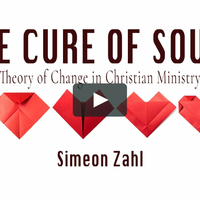Mentions
- Post
The first is that the heart of Christian ministry is the facilitation of emotional encounter with the God revealed in Jesus. The second is that the "Augustinean approach assumes that effective ministry always has to deal with the fact of human resistance to judgment and law. The third is that certain approaches don't work very well, that don't have the right kind of assumptions. And the fourth is that technologies of the heart, music, and art, and so on are really important in ministry. "
- Post
"But the Augustinian perspective tells us that they can do this only once we can do this only once our desires have already been changed enough that we want to engage in the practice. No one will develop a transformative and durable new practice of prayer unless they fundamentally want to and want to in such a way that they'll overcome the times when it's harder. But in another way, the reason so many attempts to change ourselves and others to spiritual disciplines actually founder is because the core desire isn't yet there. As Jesus told us, you have to change the tree first and the fruit will follow. The focus on the heart and the practices will follow. The focus on the practices alone and we're back to the brick wall again. "
- Post
"human beings are driven not by knowledge or will, but by desire. The human heart is very hard to change. It strongly resists direct efforts to change it. "
…after the fall, fall of human nature, human beings are wired in such a way that judgment kills love. When we feel judged, we hide our love away. We put up walls, we resist.
…the heart of Christian ministry is the facilitation of an emotional encounter with the God revealed in Jesus. If you are not successfully engaging with people's feelings and desires, with their anxieties, their loves, their suffering, their hopelessness, their pain, then you are just playing a game with Christian words, you are not doing ministry."
- Post
"But so Augustine then argued that the core engine of human nature is not our will, but our heart and its desires. He pointed out that it's really, really hard, however, unfortunately, to change hearts. So hard, in fact, that only God can do it through the Holy Spirit.
The way you change a person is by getting through not to their head, or to their will, but to their heart. And this is the work of the Holy Spirit, the things of God and to make us hate and flee from bad and self-destructive desires."
- Post
"The Pelagians, at least as Augustine saw them, had a bad theory of change. and they had a deficient view of divine grace. They thought that God worked in Christians through two means. First, He created them with a powerful capacity for moral willing. Such it to be a good person, the main thing you had to do was to deploy this capacity for willing in the right direction. Second, they held that God had given Christians a blueprint for His vision of human life through the Bible, through His laws. So they would know what it is He wants them to do. and what he wants them to use their will for. The theory of change then was to read the Bible and then try very hard to do what it says. "
- Post
"Okay, this is my second million dollar question. The first one, what is your theory of change? The second one, is your theory of change working?
Having a good theory of change, an accurate theory of change makes, is the difference between forms of ministry where you put huge amounts of energy into it and nothing happens. And ministries that work.”
- Post
"So I ask you, what specifically is it that you think you're doing on Sunday? What are you trying to accomplish? What is your goal and what are the main strategies you think are most important that goal. Are you fundamentally trying to teach people about God's vision for human life? Are you fundamentally ultimately trying to help foster a certain kind of religious experience? Is your main goal discipleship, a people who are already Christians, or is it evangelism? These are all different kinds of goals that have different kinds of strategies and theories of change that are implied? Or if you're someone more on the kind of receiving end of ministry, than the one doing the ministering."
- Post
"First, it assumes, and here very reasonably, I'm all in favor of this, that the Bible, as God's inspired word, is in many ways senses the primary instrument through which God works in Christian lives. Second and more controversially, the approach kind of subtly assumes that human beings are shaped above all by contact with Christian knowledge or information. We know in secular life that giving advice never works, we sort of think that because it's Christian advice, it's Bible advice. Now it's going to work."
- Post
"The basic idea in this talk is that every ministry is always making certain kinds of theological assumptions about human nature and about how God works in people's lives. In more technical, theological terms, you could say that every form of ministry has an implicit theological anthropology and an implicit theology of grace. These assumptions are not always conscious or clearly articulated.”
